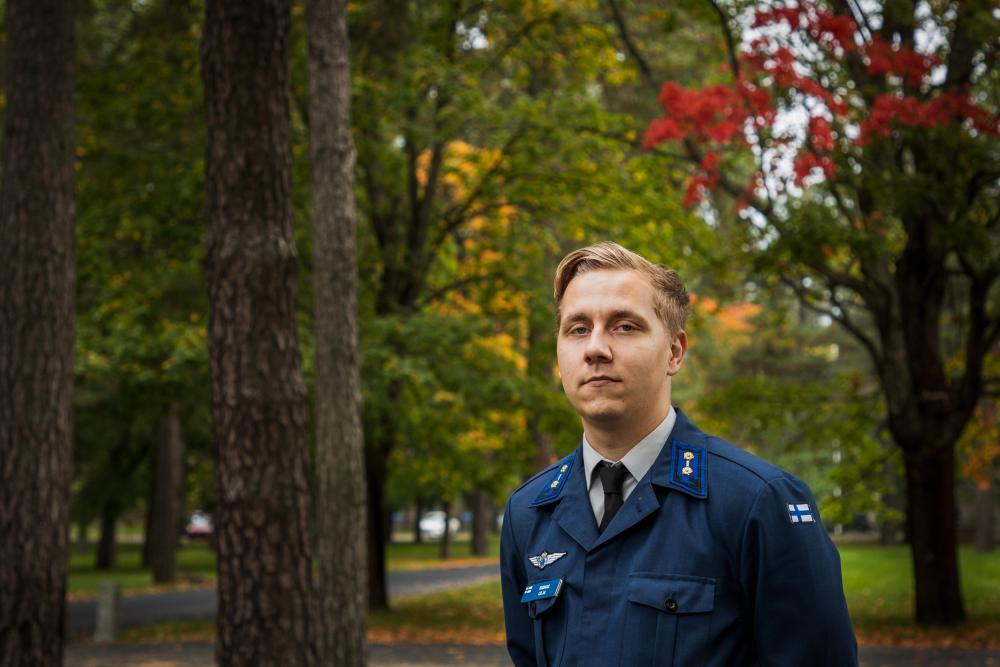Impressions from the SM10 master’s course
Press release
First Lieutenant Tuomas Lilja, one of the students on the SM10 Master of Military Sciences course, is looking forward to the master’s studies. The SM10 course, which started in September 2020, follows the new curriculum, in which the graduates from the Bachelor of Military Sciences Programme work in fixed-term posts in the Finnish Defence Forces or the Border Guard for five years before starting their Master's studies.
First Lieutenant Tuomas Lilja originally became interested in officer studies during his military service.
– I found the military service good fun and useful. I was asked to stay and work as a non-commissioned officer after the military service, and I was interested in doing it. However, I thought that by completing the officer studies, I would be able to work in more diverse positions and perhaps have an opportunity to also work in the management of this organisation.
Lilja says that he also considered other career choices before applying to the National Defence University.
– However, I specifically chose the National Defence University because it offered a clear direction for my future career and life. The NDU prepares the student for a specific profession, but the education also provides diverse skills for other kinds of work after active service.
Lilja graduated with a Bachelor of Military Sciences degree and then worked in a fixed-term post in the Defence Forces for five years. Now that he is beginning his master’s studies in military sciences, he already has several years of experience of working in his own branch.
– Lieutenant Colonel Eero Svanberg, the director of the Master's Degree Programme, said on the first week of the master’s studies that we lieutenants now have the opportunity to reflect on what we would like to do when we “grow up”. When we started our studies at the Military Academy, we signed a commitment to working in a post in the Defence Forces for a certain period of time after graduating. We have now fulfilled this commitment and as first lieutenants we have the opportunity to reflect on whether this was the right choice of career, Lilja explains. – It still feels like the right choice for me.

According to Lilja, during the bachelor’s studies, students improved their skills in their own branch, formed relationships with the fellow students and learned to be systematic and manage their time use.
– The teaching provided in the bachelor’s studies was of a high quality: we had good lecturers who were all professionals of their field. If find that we gained the basic skills for working as trainers and leaders of conscripts and had the opportunity to also see the operation of the services and branches other than our own, he says. – However, I did not learn some of the working life skills until when I was working, and the studies did not provide capabilities for everything: it has taken until now to form a rough understanding of how the administration of the Defence Forces works.
– In addition, I feel that while my competence has increased, the tasks have also become more difficult. The next phase is one in which my work tasks have been temporarily delegated to others and the only clear objective for the next few years is to accumulate as much more competence and knowledge as possible. It comes at a good time.
For Lilja, the master’s studies mean a new kind of daily life and a new home town. Although some of the studies are implemented in multiform studies, most of them are completed at the National Defence University in Santahamina.
– It is nice to live in Helsinki again and meet my fellow students after so many years. It is also nice to be able to share our experiences of working life as it was not possible to meet everyone in my work duties. But the actual student life is already clearly over and at this stage, we focus on the studies.
What Lilja’s expects from the master’s studies is especially an opportunity to focus in depth on the development of the operational capacity of the Defence Forces from the point of view of the different services. Theoretical knowledge is also a welcome support to what he has learned in practical work.
– Now that we have experience of working life and each lieutenant probably has an understanding of what they want to do in their career, I think the objective of the master’s studies is that the studies will serve as a channel for demonstrating an interest in a certain field and tailor one's competence accordingly. The master's thesis also offers an opportunity to demonstrate competence and interest in a specific topic, especially if the student aims for an academic career.
Master of Military Sciences degree
The primary task of the Master of Military Sciences degree is to train officers with the knowledge and skills required in middle management for the Defence Forces and the Border Guard. The objective is to provide the students with the prerequisites to serve as leaders within a battalion in emergency conditions, as commanding officers of a company-level unit in normal conditions and in staff positions within headquarters on international missions.
It is also possible for holders of a bachelor’s degree other than the Bachelor of Military Sciences to apply to study for the Master of Military Sciences degree. The task of the Executive Assistance Programme is to train experts in national and international security for the needs of comprehensive national defence and interagency cooperation. A degree completed in the Executive Assistance Programme does not give eligibility for the position of a commissioned officer. The application period for the next course in the Executive Assistance Programme will begin in spring 2021.



